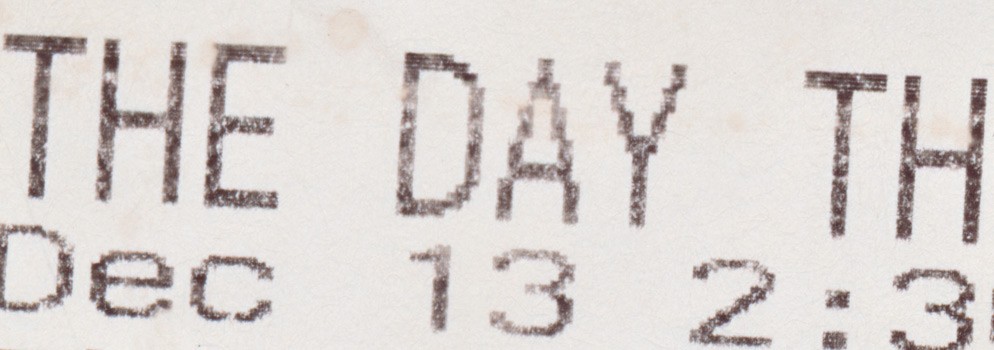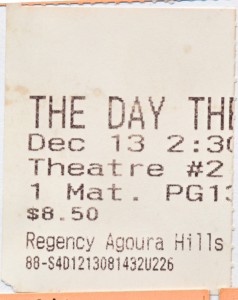The Day the Earth Stood Still

A Misanthrope’s Delight.
Now we all hate humanity, at least a little bit. That’s why we have movies. Admit it – you didn’t see Independence Day for the part where Bill Pulman raises his hands and goes, “Woo”; you saw it to watch the White House explode.

And The Day After Tomorrow? Do we really care if Jake Gyllenhaal and co. make it out alive? Do we even remember if they did? No, we want to see New York swallowed by a wave of water and then frozen. That’s why they put it in the trailer. So out pops the 2008 remake of The Day The Earth Stood Still: another opportunity to witness the annihilation of mankind – what’s not to like?
The answer to that is The Day The Earth Stood Still. I’ve made it clear: I hate humanity, but, to paraphrase, people, individually aren’t so bad. Some of them I rather like. With one horrible, horrible exception.
Jacob Benson, the kid in The Day The Earth Stood Still.
Die, Jacob Benson, Die.
If you’re coming to New York City to decide if humanity should be allowed to keep destroying the earth, this is one toxic moppet you do not want to meet. An alien race of Ghandis would break out the flamethrowers after half a second in his presence; why on earth wouldn’t Keanu Reeves?
I’m all for bratty obnoxious kid characters. They can be funny, and even sympathetic. Problem Child built a whole franchise around one. But there should be some awareness about it. When our erstwhile Master Benson is whining to kill the alien, running away, calling the police, or doing whatever he can to make life miserable for everyone, you know, the day before all humanity is extinguished, the filmmakers need to remember: just because he is a child, does not mean that this irksome character can save the world.
Everyone in the room agrees. Sacrifice is great. Can we get the other guy to do it?
[/pullquoteR]I felt a brief moment of hope about halfway through, when our heroine Ms. Connelly plans to introduce our alien to someone who will resurrect his faith in humanity. As they enter the man’s house, we hear the 1955 recording of Glenn Gould’s Goldberg Variations, and I thought to myself: Hannibal Lecter? Humanity is saved!
It turns out to be John Cleese, who himself is another reason to save humanity, if this was him in a movie made twenty eight years ago. Instead, Mr. Cleese introduces what might have been the film’s central theme, if the filmmakers could remember it for more than the half second it took for the alien Ghandis to immolate Jacob Benson: humanity changes when only when faced with no other choice. Not the most revolutionary idea, but a fairly decent one to build a movie around. The original film said it plainly: knock off all the killing business, or we’ll wipe you off the face of the earth.
But then filmic ADD kicks in again, and then it becomes about sacrifice: can man be noble enough to be allowed to survive? Perhaps another good theme to build a film around, but by now I have grasped that this has become more and more representative of the schizophrenic film experiences which arise from bloated budgets and the attendant number of overseers that come with the money.
It’s easy to criticize a lack of awareness on the part of a film and its makers. But a movie is always going to involve the exorcism of somebody’s personal demons, and there’s only so much consciousness that can be put into the process. This is how it should be. When this process involves one person, or a small group of a like mind, there is a chance to produce a particular kind of neurosis, be it fear of the dark, or compulsive desire for pretty shoes, that resonates with your neurosis. The secret is to keep this compulsion consistent.
The amorphous blob of producers, writers, co-producers, studio executives and directors that made this film, on the other hand, visibly produced 20,000 contradictory opinions, all of which really, really matter, and really, really have to be in the film. It’s a smorgasbord at the international food court, sometimes a scene is delicious, sometimes it’s too salty, or too bland, most of the time it’s boring, or disgusting. But one thing remains the same. None of it goes together.
This is why a bratty kid can make it all the way through a movie without any characters calling attention to the fact that he’s just awful, because writer David Scarpa has a stepson who ‘he’s got issues with’. This is why we can say humanity can change if given no other choice, because producer Paul Boardman read about the first film on Wikipedia, and why we forget about it, because producer Erwin Stoff felt the film needed to be about sacrifice.
Oddly enough when we finally reach the end, there is a synergistic consistency of theme, and certainly one that is only expressed unconsciously. Consider the source. We are, after all, talking about a group of people that were willing to cost the Los Angeles economy (and themselves) 3 billion dollars for a 25 million dollar contractual sticking point. I’m not pointing fingers necessarily as to who was right or wrong about the writer’s strike (or who will be right or wrong about the future actor’s strike), just to say that producers are the group that should know better. Writers are stupid, especially when it comes to money; I should know. Producers are supposed to know the difference between more than and less than.
Everyone in the room agrees. Sacrifice is great. Can we get the other guy to do it?
Which leads us to the ending, which, while idiotic, is nonetheless consistent. Death by nanobot, said director Scott Derrickson. Nanobots: kids love ‘em! So as the East Coast is wiped out, rather undramatically, by a kind of greyish smoke, and as our Heroine and her super-brat are nano-infected, they are presented with their one opportunity to show that they can be noble. But that might be depressing. So after she says save me, I mean save him, Klaatu instead saves them both, and then proceeds to sacrifice himself to save humanity. I guess the message he wanted to impart to humanity was, do whatever you want. There are no consequences for your actions. It’s something that the group could agree on.
Humanity. Just keep doing what you’re doing. You’re going to be fine.
Hooray!
Profits!
Losses!
-$3.50
The Lonely Comments Section

 [logo]
[logo]
